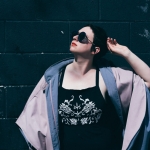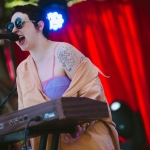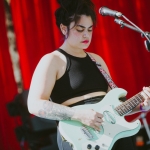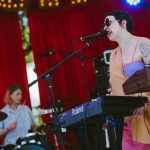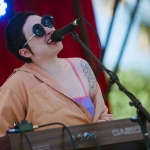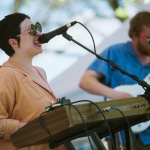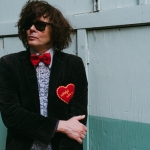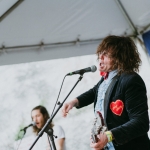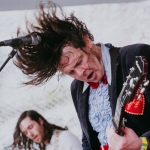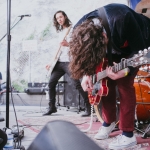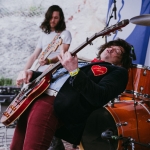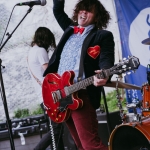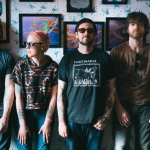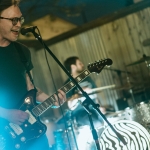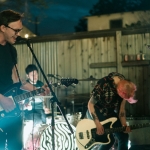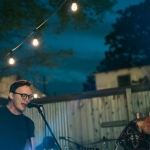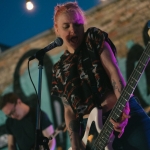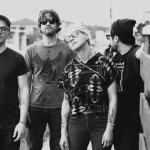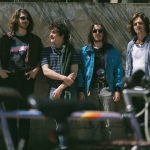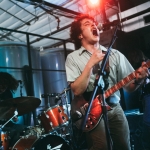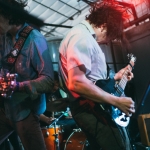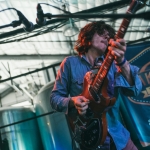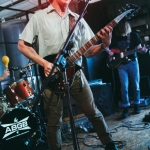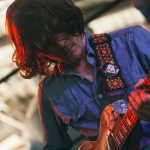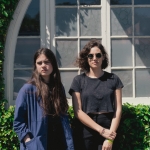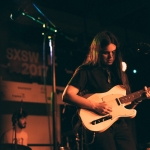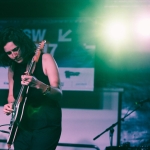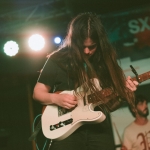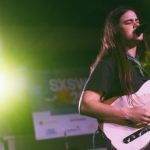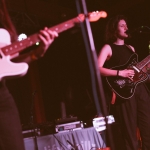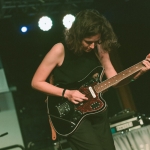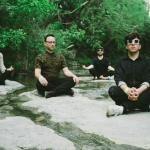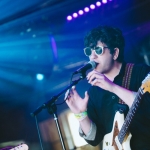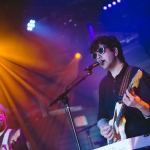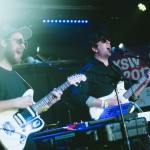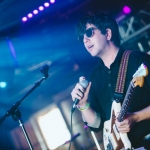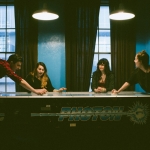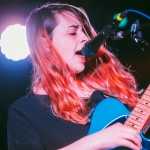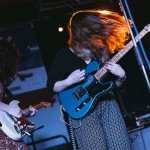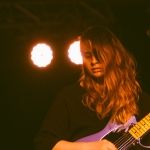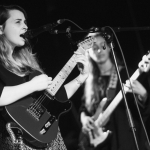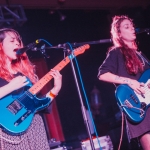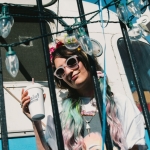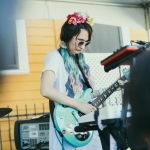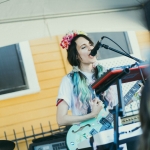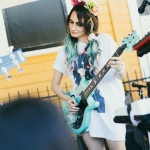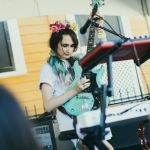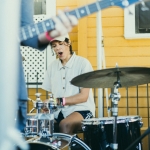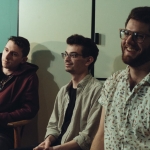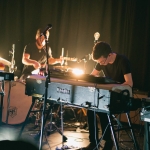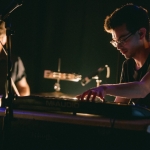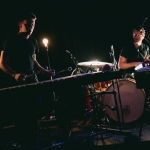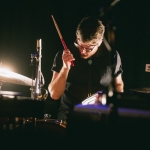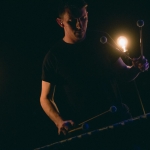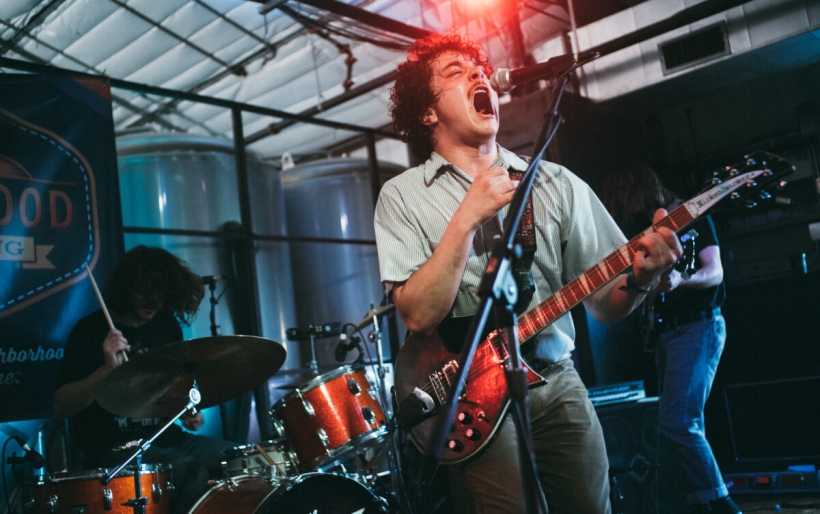
The Districts | Photo by Noah Silvestry for WXPN | silvestography.com
Finding Philly in Austin: Catching up with nine local artists at SXSW
South by Southwest: the festival to end all festivals. That time of the year when the entire world takes over the city of Austin for a week of networking, tacos, and lanyard tans. But somewhere amidst the corporate clutter, in between the long lines outside sponsored showcases and under the litter of promotional flyers strewn across the main drag of Austin’s 6th street by week’s end, is that which makes SXSW so strange and wonderful: the thousands of independent artists who chose to play more sets in just a few days than certain artists play in a year, compensated by the choice between $250 and a wristband, and the vague promise of discovery.
This year, I decided that I, myself, would participate in the SXSW hustle, running around the streets of Austin to the sound of a hundred bands at once, camera and notebook in hand (which is nothing, really, compared to the gear most musicians were toting) to catch up with nine of Philadelphia’s own artists showcasing at this year’s festival. Below, read excerpts from our conversations, and see photos from their live sets.
Allison Crutchfield
- Allison Crutchfield | Photo by Noah Silvestry for WXPN | silvestography.com
- Allison Crutchfield | Photo by Noah Silvestry for WXPN | silvestography.com
- Allison Crutchfield | Photo by Noah Silvestry for WXPN | silvestography.com
- Allison Crutchfield | Photo by Noah Silvestry for WXPN | silvestography.com
- Allison Crutchfield | Photo by Noah Silvestry for WXPN | silvestography.com
- Allison Crutchfield | Photo by Noah Silvestry for WXPN | silvestography.com
On becoming a solo artist…
Allison Crutchfield: I started doing solo stuff kind of as an experiment when I was in Swearin’. I was having a hard time writing songs when we were working on Surfing Strange. I was starting to think, maybe this is getting a little creatively oppressive, having to write for this band and be this voice for three other people. So I decided to do the solo EP after that. It’s very natural for me to collaborate people, so if stuff with Swearin’ hadn’t gone the way it did, I probably would still want to focus on that because I love being in a band. But it didn’t, and I had written all of these solo songs and had this clear-cut vision for the record, so that was really driving me. I do miss being in a band.
On synthesizers and Tourist in this Town…
Since I was relying more on myself, I felt like the record needed to be a bit more intentional and planned. It was the first big record I’ve made with someone I wasn’t super close with—it was just me and Jeff. I wanted to be really prepared. Swearin’ specifically, and P.S. Eliot to an extent, were bands that really thrived on each other’s energy. When you’re doing a solo record, it’s a little harder to do that.
On her twin sister, Katie (Waxahatchee)…
People who see us on the street are like, “you look so much alike,” and I’m like, “no, we don’t.” I feel the same way about our voices. But at the same time, we have the same DNA, and that’s a big reason that I’m in Waxahatchee. Blood harmonies, you know. I remember when I was 20, Katie would send me like 3 demos for the American Weekend album per day—she wrote that album in, like, a week. So I’ve always been such a huge fan. Once it took off and became more of a rock band, I secretly really wanted to be in the band, and finally she was like, “Oh, why are you not in the band?” So now I am, and it’s great.
Since I’ve started doing the solo stuff, we’ve needed a little more space, creatively. Originally I had wanted her to produce my solo record, but once I started making it, we both thought, maybe it’s better not to.But she sent me every song from the new record she just made, and I’d give her notes. But at the same time, you just sort of have to be like, “I love it!” It’s funny, I think Katie and I don’t want honest feedback, we both want affirmation. We both, as songwriters, really thrive on honesty, so I don’t edit. She does more lyrical editing than I do. Everything that I do is really instant and cathartic, so it would be hard to have someone say, “well, maybe you should change that.” But we’re sort of each other’s biggest fans.
On future albums…
I’m imagining that I’m going to start working on the next record this year, in the next couple months. I’m really feeling it. I’m very consciously not going to write about romantic relationships in the future, or at least on this next record. I’ll always write about personal shit, that’s just my bread and butter. But I do want to write about things other than romance.
Beach Slang
- Beach Slang | Photo by Noah Silvestry for WXPN | silvestography.com
- Beach Slang | Photo by Noah Silvestry for WXPN | silvestography.com
- Beach Slang | Photo by Noah Silvestry for WXPN | silvestography.com
- Beach Slang | Photo by Noah Silvestry for WXPN | silvestography.com
- Beach Slang | Photo by Noah Silvestry for WXPN | silvestography.com
- Beach Slang | Photo by Noah Silvestry for WXPN | silvestography.com
On Cover Mixtapes…
James Alex: When I was coming up, I felt like the best thing I could do for the people I loved was make them a mixtape, so it’s kind of a big a big, fat thank-you on behalf of this band. For people who knew those songs, it’s a reminder, like, remember how good this was? And maybe people who didn’t hear it before can get turned on to new stuff. The other part is that when we were first coming out, we were getting a lot of Replacements and Jawbreakers comparisons, and I wanted to round out the whole narrative. That stuff means a whole lot to me, but here’s this whole other well of people I’ve been trying to rip off for years. Maybe give them a listen, you know? I sang “Sometimes Always” by the Jesus and Mary Chain with Charlie [Lowe] here, so that’s probably the current frontrunner for my favorite cover. That was her first time ever singing on a recording. And I’m going to keep doing them for sure. I plan to do at least two per year.
On the weirdos…
I have an affinity for the weirdo daydreamers. I’ve always kind of felt sort of outcast, just figuring out where I fit in. I’ve always found that those people are the most incredible folks I’ve ever come around, but don’t know that they are. So it’s kind of a gigantic wake-up call to let them know that they’re not just worth it, but they’re fucking marvelous.
On being a punk in your 40s…
I’ve been doing this kind of music since I was a teen, so I guess I’ve sort of gotten stuck in this state of arrested development, almost by choice. Rock ’n’ roll is a really wonderful excuse not to have to grow up, so I’ve always stayed tapped into that. I said this a while back, but just because you’re 35 doesn’t mean you have to retire from being alive. At first, I was speaking to my peers who kind of gave up, and now I see them sort of dead-eyed and crushed, but you don’t have to do that. I’m trying to throw out that thing of getting to be 75 years old and starting a conversation with “I wish I would have…” So this is me trying to sound that alarm before you hit that.
A really cool byproduct of Beach Slang has been how many people have come up to me and told me that they pulled the guitar out of the closet or started a band. Even if it’s just a weekend thing, it’s like, right on, you tapped back into that thing that lit you up when you were 18. Never let go of that.
Creepoid
- Creepoid | Photo by Noah Silvestry for WXPN | silvestography.com
- Creepoid | Photo by Noah Silvestry for WXPN | silvestography.com
- Creepoid | Photo by Noah Silvestry for WXPN | silvestography.com
- Creepoid | Photo by Noah Silvestry for WXPN | silvestography.com
- Creepoid | Photo by Noah Silvestry for WXPN | silvestography.com
- Creepoid | Photo by Noah Silvestry for WXPN | silvestography.com
On leaving (and returning to) Philadelphia…
Pat Troxell: Before we moved to Savannah, Georgia, we were like, alright, we’re going to move away so we can concentrate on being a band. Get away from our jobs and families and cliques of friends so there was no distraction. We wrote a record and toured almost all of that year—we were on the road for ten months total that year. And when we got done, we realized that the point of moving was to make a record, get picked up by a label and become a touring band, and we accomplished all that in a year. So it was like, let’s go home, let’s go back to our friends!
Anna Troxell: In our minds, going full time and moving was a symbolic jumping-off point, letting go of everything in the past.
Sean Miller: We did a ritual, wore costumes.
AT: Pete didn’t like the costumes we picked out, so he split ways with us.
Pete Urban: Way too many sequins.
AT: But we’ve come full circle. Pete’s back, and we’re back in Philly now.
On inspiration, revival…
PT: A lot of the bands that are inspirational to us were at a moment in time where only a certain album was really great. A pure example is Beck. One Foot in the Grave was a huge inspiration to us when we started writing songs. Does that mean I think everyone should go buy Odelay? Fuck no.
PU: If you find it at a thrift store for a couple bucks, pick it up.
PT: The bottom line is that a lot of the bands that are considered “revivalist” or whatever didn’t actually grow up in the ‘90s. When I was 12 years old, Oasis was the biggest band in the world. Nirvana was the biggest band in the world. Those bands were right in front of my face every day. The real thing that pushed us is the other bands like Unwound and Shotmaker. Slowdive and My Bloody Valentine are great and everything, but songs on Unwound’s Leaves Turn Inside You have the reverb and delay. If someone reviewed it and didn’t know who the band was, they’d say the same thing, and it’s insulting. We like those records, but that doesn’t mean I’m staring at the ground trying to be loud as fuck. I’d rather go listen to Lee Hazlewood and smoke weed in my backyard than do that.
On Anna & Pat’s marriage…
AT: It’s probably better for us than it is for them. We really enjoy it because we get to travel a lot. There’s probably also something to us being the rhythm section. People have told me many times that they can tell we know each other well.
PT: We’ve been married longer than the band’s been a band. Anna didn’t start playing music until a little later, but with her art, it was pretty easy to translate the idea of public performance and what we were really going for.
The Districts:
- The Districts | Photo by Noah Silvestry for WXPN | silvestography.com
- The Districts | Photo by Noah Silvestry for WXPN | silvestography.com
- The Districts | Photo by Noah Silvestry for WXPN | silvestography.com
- The Districts | Photo by Noah Silvestry for WXPN | silvestography.com
- The Districts | Photo by Noah Silvestry for WXPN | silvestography.com
- The Districts | Photo by Noah Silvestry for WXPN | silvestography.com
On working with John Congleton…
Rob Grote: If and when we do work with someone, it’s just really important for us to get along with them. That’s the key for John. We’re picky about what we want, and it’s nice when you explain an idea and the person knows exactly what you want.
Pat Cassidy: It’s another person to bounce ideas off of, and another outside opinion of someone who’s not close to it or playing an instrument. A big thing with this album was restraint, so it was good to have someone to be like, “Oh, that is good not to play there.”
On the new album, and restraint…
RG: We’ve been working on it for a while. We took most of a year off, touring here and there, but we wrote a lot of songs and were shooting for a certain thing, and over time got there. Sonically we thought a lot more about arranging things differently than before, and really got specific. We’re trying to make certain sounds happen and have a purpose. Lyrically, with a lot of the new songs, I was trying to speak more narratively, in a sense.
A lot of that restraint was understanding that, at a live show, there’s a lot more elements than just the music, you’re watching. And even a band like The Clash, if you’ve seen live videos of them, it’s a different thing. So we really focused on using arrangements and restraint to make things more powerful when they do happen. Just controlling the dynamics.
On playing new material live…
Connor Jacobus: My favorite thing is just meeting new people and traveling. For this tour, it’s been fun playing all the new songs and seeing how people react.
PC: You also have to win the people over that don’t know the recorded songs. We know how it sounds, so you have to represent that. The nice thing about it is that nobody is there wanting you to sound bad, so at least you have the benefit of the doubt, hopefully.
On gas station goggles…
PC: Rob and I found these goggles at a gas station the other day. They make us faster and give us energy. We’ll show you sometime.
CJ: How can you not buy those?
The Dove & the Wolf:
- The Dove & the Wolf | Photo by Noah Silvestry for WXPN | silvestography.com
- The Dove & the Wolf | Photo by Noah Silvestry for WXPN | silvestography.com
- The Dove & the Wolf | Photo by Noah Silvestry for WXPN | silvestography.com
- The Dove & the Wolf | Photo by Noah Silvestry for WXPN | silvestography.com
- The Dove & the Wolf | Photo by Noah Silvestry for WXPN | silvestography.com
- The Dove & the Wolf | Photo by Noah Silvestry for WXPN | silvestography.com
- The Dove & the Wolf | Photo by Noah Silvestry for WXPN | silvestography.com
On Paris & Philadelphia…
Lou Hayat: We originally came to the states for a tour, and we had this visa for a year, so we figured we’d stay longer. Philly was the city we liked most on that tour, and we had a lot of friends there already, so we decided to come check it out for a second and never left.
Paloma Gil: We actually wrote those songs while we were there. We were in Philly for a year, and our visas expired and we had to renew them. So we went to Paris, and it took five months or something, and that’s when that all happened. It was actually interesting because we were there from September until the end of January, and we didn’t really write. But when we got the visa and realized that we were going to come back, we wrote all the songs very quickly. We were like, we need to write these songs that we have in us before we return to the States.
On writing lyrics in English…
LH: It’s not something we think about, because we speak more English than French. It’s actually weirder to write in French for us. Some songs come from conversations, and since all of that is fresh in your head in English, it comes more naturally.
PG: A lot of the things we experience, we experience them in English since we live here, so it makes more sense writing in English than in French. It’s not like we write in French and then translate to English.
On working with Dave Hartley…
PG: He’s the best. I don’t really know what to say. Our tastes are very similar, so it’s a lot of fun. We’re friends. His Nightlands record is my favorite of the year so far.
LH: And it’s not even out yet.
On Tinder dates…
PG: We were playing in Dallas and didn’t have a place to stay, and had a flight at 6 a.m. But I matched with a girl on Tinder so I put her on the list and she came to the show. And she was like, “What are you doing after the show, do you have a place to stay?” And I was like, “We don’t have a place to stay, but our flight is at six, so we have to be at the airport at like 4:30, so I feel like we’re just gonna go there.” She was like, “You guys are welcome to come to my place, but I just got the keys—it’s an empty apartment, I don’t have any furniture, not even a blanket, a couch, nothing, not even toilet paper in the bathroom.”
LH: So I go into the apartment, I was tired and in a bad mood. I was really cold, it was late, and I didn’t understand that the apartment was going to be fully empty. I thought there was going to be maybe a couch. I explore the apartment for a minute, and I find the smallest room, and I see that in the smallest room there’s an even smaller room, a closet. And I go in the closet, and I sleep in the closet.
PG: I slept on the floor too, and then she gave us a ride to the airport. She was really sweet. She and I went to Walgreens and she bought us Peeps pillows. She’s coming to SXSW.
Eric Slick
- Eric Slick| Photo by Noah Silvestry for WXPN | silvestography.com
- Eric Slick| Photo by Noah Silvestry for WXPN | silvestography.com
- Eric Slick| Photo by Noah Silvestry for WXPN | silvestography.com
- Eric Slick| Photo by Noah Silvestry for WXPN | silvestography.com
- Eric Slick| Photo by Noah Silvestry for WXPN | silvestography.com
On being a drummer-turned-frontman…
Eric Slick: There’s been so much learning to do. I’ve been playing music my whole life and I’m just starting to figure out how to be in a band. It’s different—in the back, I can hide and make stupid faces. Up front, I have to tone it down a little bit. But it’s also a joy to play with my closest friends and not have it be in the context of other people’s songs.
The first song that I wrote was in 2009, then I didn’t write anything for another 3 years. 2012 was the first time I was actually able to finish a song. Then 2014 was when I first felt comfortable releasing anything, first with Lithuania and then through various solo records.
On writing for multiple bands at once…
I take a lot of inspiration from Robert Pollard of Guided by Voices. He’ll just write a song, and then he’ll put it into a pile. So I’ll say, this song goes into the Eric Slick pile, this one goes into the Lithuania pile. I don’t hold much water in the Dr. Dog camp—I’ll write melodies sometimes. But things have a certain energy around them, so it’s pretty easy to tell what’s what.
On meditation and his forthcoming LP, Palisades…
The entire record I’m about to put out, Palisades, was almost entirely written in North Carolina. I went out into the middle of no where and did the indie-rock-dude-goes-to-a-cabin thing.
All of the songs were born out of my process of meditation. I’ve been doing it since 2011, but it didn’t really start to affect my creative process until a while after that. It’s a life path thing. My best friend passed away—he had leukemia. We were both 24 years old at the time, and I didn’t really know how to process it. My friend gave me a book by David Lynch called “Catching the Big Fish” that’s all about meditation. So after that, I got the energy to pull myself out of bed and meditate.
Sometimes, when you meditate, crazy things happen and a song will come to you fully-formed. Sometimes you’ll come out of meditation and just be living your mundane life. There’s a real ebb and flow to it. If I’m meditating successfully, if I’m getting to a place of no thought, then usually a good idea is going to happen. But sometimes bad ideas happen too. I’ll be meditating before writing an Instagram post, and evil Ronald McDonald will come into my head, and that’s the pervasive thought.
On Philadelphia…
I like things in the weirder spectrum. Philly does weird really well. It has this amazing convergence of melodic and atonal. And that’s where I like the most stuff.
Queen of Jeans
- Queen of Jeans | Photo by Noah Silvestry for WXPN | silvestography.com
- Queen of Jeans | Photo by Noah Silvestry for WXPN | silvestography.com
- Queen of Jeans | Photo by Noah Silvestry for WXPN | silvestography.com
- Queen of Jeans | Photo by Noah Silvestry for WXPN | silvestography.com
- Queen of Jeans | Photo by Noah Silvestry for WXPN | silvestography.com
- Queen of Jeans | Photo by Noah Silvestry for WXPN | silvestography.com
On road trip playlists…
Nina Scotto: I made a roadtrip playlist and I get criticized for taking it very literally. It’s all songs about driving and being on the road, just for hours. A lot of songs named “Drive.”
Miriam Devora: I like any ‘60s girl groups like The Shirelles, and then Darlene Love. Roy Orbison, of course, for my ‘60s fix. But on the road, we listen to a lot of Mitski, PWR BTTM, Big Thief, Palehound, Angel Olsen.
On moms…
MD: Today we put a bunch of fake tattoos all over our bodies.
NS: And spent an hour texting our moms about it. They all believed they were real. My mom got mad, and I was like, “Mom, I would not get multiple dolphins and cherries tattooed on my arm.”
Mattie Glass: Our moms come to our shows. It’s adorable, we love it. My parents were actually talking about coming down here. They were like, “Oh, we could make a vacation out of it.”
On interning for WXPN…
Patrick Wall: I interned for WXPN in college, in 2009. And then I worked in the box office at World Cafe Live for a year. It was incredible. This was before The Key—I was writing for the WXPN blog, so they’d be like, “Just go to Free at Noon and write about it!” The coolest thing was working at World Cafe Live.
I remember one time I was having an argument with my manager about when [Outkast’s] Stankonia came out. David Dye walked past and was like, “2001.” Where else can you get that? I also used to drive for the festival, so I’d pick up artists from the airport and drop them off behind the stage and think to myself, “some day…” and never actually believed it would happen. So to play XPoNential in July was surreal.
On their new record…
MG: We got the mix for our album literally as we pulled up to this venue. Vince Ratti mixed it—he does Brand New and Circa Survive—and we recorded with our friend Brian Ziprin. We drove down to Nina’s parents’ beach house in Jersey and recorded with him kind of DIY-style.
PW: There’s some beach sounds in there.
NS: We don’t have a release date yet, but the people should know it’s done. It’s coming.
MG: It sounds kind of like the EP grew up. Side A has more of the “Dance,” “Rollerdyke,” kind of stuff, and side B gets more into the “Moody” vibe, the weirder stuff.
Sad13:
- Sad13 | Photo by Noah Silvestry for WXPN | silvestography.com
- Sad13 | Photo by Noah Silvestry for WXPN | silvestography.com
- Sad13 | Photo by Noah Silvestry for WXPN | silvestography.com
- Sad13 | Photo by Noah Silvestry for WXPN | silvestography.com
- Sad13 | Photo by Noah Silvestry for WXPN | silvestography.com
- Sad13 | Photo by Noah Silvestry for WXPN | silvestography.com
On feminism…
Sadie Dupuis: Feminism is about human equality across gender lines, but also about racial equality, about sexual orientation, about economic equality. I would argue that it’s a feminist album, obviously, and I would argue that those concerns aren’t specifically relegated solely to women. Often our politics derive from our human experiences, especially our collective experiences with regard to identity. The album is about my experience, but it’s also about shared experiences that other friends have gone through.
Hopefully, for listeners who haven’t gone through those experiences, it’s about learning empathy, how to be supportive and an ally to people who have gone through those kinds of things. Certain performers that I view as inspirations—Downtown Boys, or Priests—are really good at using their time on stage with a microphone to say the things that they feel people should know. I feel like I do that better in lyrics. I don’t know that, with the hustle that is SXSW, and a million sound engineers working 12-hour days, 50 bands a day, I don’t know that those lyrics come across right away, but the best I can hope is people have a good time hearing the music, and then go home and check out the record and maybe relate to it in some way.
On Philadelphia…
My favorite thing about being a Philly artist is the fact that you even called me one. I’ve been there a year, I guess I finally qualify. Lucy Stone, who plays in Vexxedis playing in Sad13 on this tour. I’ve been playing some with Andy Moholt, who’s in Laser Background as well as a number of other projects. But I think part of the reason I moved to Philly is I already had so many close friends in bands who live there—Waxahatchee and Allison Crutchfield, Radiator Hospital, Swanning, Spirit of the Beehive, Gunk, bands like that.
On self-producing…
The very first Speedy release were just things that I home recorded and played everything and put out. As we became a band, I would still make demos that way, I just wasn’t releasing them. So I’ve gotten better and better at recording over the last six years, I just haven’t been putting it out. The big learning curve has been figuring out how to do it live. In the studio, I can play anything, but live, I’ve only ever played guitar. The synth parts are kind of tricky while also singing. I’m using ableton for the first time live, to play with some of the tracks I’ve already made. So that’s been more of a learning curve, but it’s always fun to try somethings different.
Square Peg Round Hole
- Square Peg Round Hole | Photo by Noah Silvestry for WXPN | silvestography.com
- Square Peg Round Hole | Photo by Noah Silvestry for WXPN | silvestography.com
- Square Peg Round Hole | Photo by Noah Silvestry for WXPN | silvestography.com
- Square Peg Round Hole | Photo by Noah Silvestry for WXPN | silvestography.com
- Square Peg Round Hole | Photo by Noah Silvestry for WXPN | silvestography.com
- Square Peg Round Hole | Photo by Noah Silvestry for WXPN | silvestography.com
On studying percussion performance…
Evan Chapman: We all met as performance majors and started playing in the school percussion ensemble together, and the more we played together and the more we got familiar with the repertoire, we started to veer off and do our own thing, slowly morphing it into more of a rock band. All of us do a lot of composing, but we didn’t go to school for composition. We still learned things that help with our composition process now like music theory and history, and studying that repertoire.
Carlos Pacheco-Perez: We definitely take cues from some contemporary classical things. Steve Reich and David Lang are some examples. It’s not like we’re trying to say, “this song is like Steve Reich,” but it’s using some of those techniques to write our music too.
On making academic music accessible…
CPP: When we were in school, a lot of the music was in this academic loop, where the only people that hear it are in academia, and so are the people who play it. So we really wanted to not do that, and make music that’s more for the people.
Sean Gill: Writing like that gives us more freedom. There are less rules when you’re free from both the classical and the rock genres, or whatever else influences us. The other component is the performance space. It’s a lot more fun playing at bars and theaters than concert halls and music schools.
On communicating without words…
CPP: We’re not really great with words, so it’s easier to speak without words and convey an emotion through instrumental music. We try to instill a certain mood in a song, and that happens naturally. We don’t think, “we want to make a happy song,” and then, boom, happy song. It’s more like, this melody is happier, or this groove feels somber, and then you run with it.
EC: Several times, the environment in which we’ve written pieces has lent itself to the mood. We’ve written songs in a cabin when it was snowing outside, and those songs are the more chill ones. We’ve written songs in the middle of summer on a tour, and those turn out a little more upbeat.
On being the “weird ones”…
SG: We moved to Philly when we all got out of school. The midwest wasn’t where we wanted our flourish. We wanted to move to the east coast, and we had recorded our first record in Philly and had a couple friends there. So it made sense. But when got to know the music scene, we pretty quickly fell in love with it. Since then, it’s been surprising how quickly we’ve been embraced by a really awesome audience. We’ve gotten to work with some bands that we really love, and we’ve made friends with those people. W.C. Lindsay was a huge help. Moon Bounce is one I love a lot. Son Step, we’ve played with and are playing with again in May. We’ve worked with Josh Miller a ton.
CPP: Most of the Philly scene is not at all our genre, so it’s been funny being in a place where we’re the weird ones, but trying to fit in in our own way.

